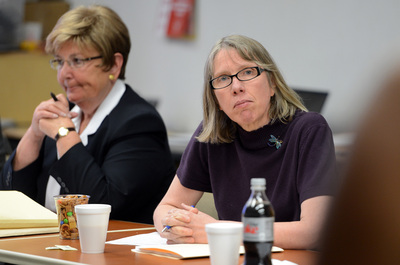The Ann Arbor Board of Education will revisit the topic of superintendent evaluations at Wednesday's Committee of the Whole meeting.
The meeting officially will begin at 7 p.m. at the Balas Administration Building to allow for a 5:30 p.m. closed, executive session for Superintendent Patricia Green's mid-year review.

Ann Arbor school board President Deb Mexicotte and Superintendent Patricia Green, left, listen to community members at a 2012 Board of Education Committee of the Whole meeting.
Melanie Maxwell | AnnArbor.com file photo
Green received a positive evaluation last June that congratulated her on her successful first year at AAPS. The Ann Arbor school board traditionally issues a public statement following the formal review, but the informal mid-year reviews take place entirely in closed session.
Prior to Green's formal evaluation in 2012, there was much discussion about how the board should proceed with the evaluation process in light of new state requirements. The board will take up this conversation again on Wednesday.
In July 2011, Gov. Rick Snyder signed into law Public Act 102, part of a package of bills known as Michigan's teacher tenure reform law or the Revised School Code. The Michigan Council on Educator Effectiveness immediately was established and tasked with developing a statewide teacher evaluation system.
And while clarity on teacher evaluations from the state and the MCEE has started to trickle down to the local level, school boards still are left with little guidance on how to judge the performance of their sole employee: the superintendent.
Starting in the 2013-14 academic year, 25 percent of superintendents' effectiveness ratings must be based on student growth data. Student attendance rates also must be factored into their ratings. There also has been some initial speculation that the state might require a written ratings system or evaluation for superintendents, similar to what is required of teachers.
Currently, the Ann Arbor school board does not fill out or retain any documents to evaluate its superintendent. Some trustees may write notes or fill out a mock survey or sample evaluation form to help guide them through the group discussion on the superintendent's performance, but the district does not retain these notes. The board produces a summation statement at the close of the evaluation discussion that is then released to the media and put in the superintendent's personnel file.
Vice President Christine Stead is leading the superintendent evaluation discussion for the Ann Arbor board.
The big question to consider this year will be which metrics and data to use to gauge student growth, Stead said. She added the superintendent obviously influences student achievement growth differently than a teacher does.
"We need to think hard about what is going to be the most meaningful way to look at the data we have for the superintendent, and how we would like to have that data rolled up — whether it would be by building, or MEAP scores district-wide, all of our desegregated (student population) subgroups by grade level ," Stead said. "There are a lot of options but it's about picking a good set of what we think reasonable measures are for the superintendent."
She said there also are a number of other measures that could be of interest to the board that go beyond student achievement, for example: student discipline data or decisions made regarding the hiring and firing of key staff.
Mexicotte said the board is going to attempt to do this in anticipation of what it could be asked to do in the future by the state.
"But we're going to do it proactively, since the state has not been forthcoming in timely fashion," she said.
The board not only will need to identify the set measurements it would like to use when conducting the superintendent's performance review, but it also will need to establish guidelines for what to do if the superintendent does progress on her goals and missions.
Last year, there was a lengthy discussion on how to include public opinion in the evaluation process. A few board members talked about surveying all of the Ann Arbor Public Schools' parents to give them the opportunity to provide feedback for the board on how they perceive the superintendent is doing.
"I think there are mixed opinions on the board about the value of that — is it a good use of people's time, not just our own. But I expect it probably will be brought up again," Stead said.
Mexicotte said some members of the board struggle with the confidentiality and anonymity pieces of polling or surveying the public and not knowing whether the survey respondent has interacted with the superintendent in a meaningful way. She said the question then becomes is it simply interesting to have this information, or is it useful to the board's decision making?
"Personally, I will have that in mind as I enter Wednesday's conversation (about the evaluation process)," Mexicotte said.
Danielle Arndt covers K-12 education for AnnArbor.com. Follow her on Twitter @DanielleArndt or email her at daniellearndt@annarbor.com.